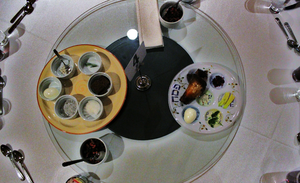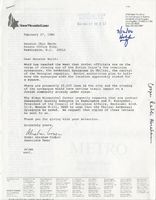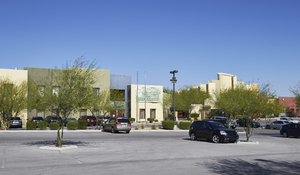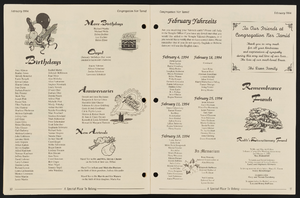Search the Special Collections and Archives Portal
Search Results

Photographs of Fran Fine-Ventura at the Smith Center, Las Vegas (Nev.), circa 2015
Date
Archival Collection
Description
Fran Fine-Ventura posing outside of the Smith Center and in front of Tim Bavington's sculpture "Pipe Dream" in Las Vegas, Nevada.
Image
Rabbi Mendy Harlig oral history interview
Identifier
Abstract
Oral history interview with Rabbi Mendy Harlig conducted by Barbara Tabach on October 18, 2017 and November 01, 2017 for the Southern Nevada Jewish Heritage Project. Harlig discusses the Chabad of Green Valley, the Las Vegas, Nevada Metropolitan Police Department Police Chaplain, and the public Hanukkah menorah at District in Green Valley.
Archival Collection
Marc Ratner oral history interview
Identifier
Abstract
Oral history interview with Marc Ratner conducted by Barbara Tabach on August 23, 2016 and May 19, 2017 for the Southern Nevada Jewish Heritage Project. Ratner talks about mixed martial arts (MMA) fighting, and joining the Ultimate Fighting Championship (UFC) organization after a long career with the professional boxing commission.
Archival Collection

Photographs from the Holocaust Education Seder event at the Rio Hotel, April 6, 2014
Date
Archival Collection
Description
An essay by Esther Toporek Finder accompanying the photographs describes the event: "Holocaust survivors, along with Clark County students and teachers, sat down to break matzo and bread together at Las Vegas? first Holocaust Education Seder Sunday (April 6) at the Rio Hotel. Three generations from the survivor community gathered with middle and high school students and teachers from elementary, middle, and high schools. The leader for the traditional portion of the service was Rabbi Sanford Akselrad and the Shoah segments were led by Professor Esther Finder. Kevin Janison, from MyNews3, served as host and MC. Both Finder and Janison are children of Holocaust survivors. Ray Fiol lit candles on behalf of the approximately six million Jewish victims of the Holocaust and a 7th candle to represent the non-Jewish victims of Nazi atrocity. Music was provided by Cantorial Soloist Lola Rivera. Educator and librarian Susan Dubin shared original poetry as part of the blessing after the meal. Participants dined on foods traditional for Passover: matzo ball soup, roasted chicken with matzo kugel, tsimmis and a non-dairy chocolate dessert."
Image


Photograph of Congregation Ner Tamid exterior, Henderson, Nevada, May 24, 2016
Date
Archival Collection
Description
Exterior of Congregation Ner Tamid on the Greenspun Campus for Jewish Life, Learning & Spiritual Renewal.
Image

Transcript from interview with Mike Unger by Barbara Tabach, January 21, 2016
Date
Archival Collection
Description
In this interview, Unger reflects upon his long and successful career in hotel management in Las Vegas and also in Arizona and Pennsylvania. He shares stories as a local celebrity, particularly in the 1970s and 1980s when he worked at Caesars Palace, as well as the big projects he oversaw, including organizing the first big fight nights, World Series of Tavern Poker and Grand Prix race. He talks about working with Morris Shenker, Moe Dalitz, Cliff Perlman and Billy Weinberger, and the role of the Jewish community in the city, and specifically in the gaming industry. Unger also discusses his non-gaming industry ventures which have included a satellite communications business and a bagel business.
Mike Unger was born in Queens, New York in 1947, and spent most of his childhood in Long Island, growing up in a predominantly Jewish and Italian community. As a young adult, Unger was already working hard, running one of his family?s restaurant after school. When he was in high school, his family moved to Los Angeles to accommodate his father?s health needs, and eventually end up in Las Vegas by 1967. Over the next two decades, Unger would work at nine properties in the city. Unger is one of the University of Nevada, Las Vegas? first hotel management graduates, and started his career with Summa Corporation in its management training program at the Frontier Hotel and Casino. After a brief stint at the Airport Marina Hotel in Los Angeles in 1972, Unger returned to Las Vegas, serving in management capacities at the Aladdin Hotel and Casino, Summa Corporation headquarters and Landmark Hotel and Casino. In 1978, he joined Caesars Palace Hotel and Casino management team, and was integral in creating the city?s first large boxing events, the World Series of Tavern Pool, and the Grand Prix race. Unger also ran properties for the White Mountain Apache and Colorado River Indian Tribes in Arizona, as well as the Showboat Hotel and Casino. In this interview, Unger reflects upon his long and successful career in hotel management in Las Vegas and also in Arizona and Pennsylvania. He shares stories as a local celebrity, particularly in the 1970s and 1980s when he worked at Caesars Palace, as well as the big projects he oversaw, including organizing the first big fight nights, World Series of Tavern Poker and Grand Prix race. He talks about working with Morris Shenker, Moe Dalitz, Cliff Perlman and Billy Weinberger, and the role of the Jewish community in the city, and specifically in the gaming industry. Unger also discusses his non-gaming industry ventures which have included a satellite communications business and a bagel business.
Text

Transcript of interview with Charlene Herst by Barbara Tabach, September 09, 2016
Date
Archival Collection
Description
In 2014, Charlene, n?e Friedkin, Herst retired from her state government career, settled into volunteer work, being a mother and grandmother, and being a grant writer for others. After thirteen years in Carson City, she came back home to Las Vegas. Charlene was eight years old when her parents, Patricia and Richard Friedkin, moved their family to Las Vegas from northern California. She remembers vividly the hot day that they arrived and moved into a rental house in the desert across from Woodlawn Cemetery. Her father, formerly in the grocery business, found work at Vegas Village. Two years later they moved ?into Las Vegas at the very edge?which was Oakey.? She recalls people she has known since those first years who have been instrumental in the growth of Las Vegas; the challenges of being a divorced single mother of four; and the career path that began with an invitation from Gene Greenberg to apply for a part time position at Channel 3, where he was sales manager. At Channel 3 she quickly went from part time to full-time. She started the Community Projects Board, which brought together nonprofit organizations together at the studio in the 1980s to identify and develop marketing campaigns that addressed social issues in the community. Initiatives included Baby Your Baby and Smoking Stinks. While working for Channel 3, she also attended UNLV and received a communications degree in 1995. In 1997 she worked at Sierra Health Services in public relations. Then in October 2001, Charlene started her career in state government as the Nevada State Health Division?s Manager of the Tobacco Program. Over the course of her thirteen year career with the state, she was promoted to positions that continued her dedication to improving the quality of life of all Nevadans. She was instrumental in the implementation of the Nevada Clean Indoor Air Act (2006); improving prevention services to women; reducing the rate of substance use and abuse in the state. The date of her retirement, October 10, 2014, was officially proclaimed in honor of Charlene Herst by Governor Brian Sandoval.
Text


